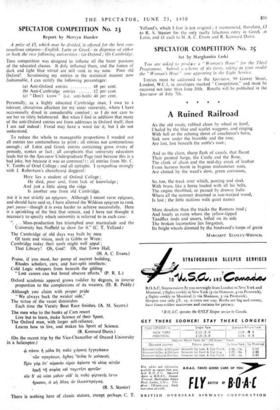SPECTATOR COMPETITION No. 23
Report by Mervyn Horder A prize of f5, which may be divided, is offered for the best con- tumelious epigram—English. Latin or Greek—in dispraise of either or both the two following universities: (a) Oxford ; (b) Cambridge.
THIS competition was designed to inflame all the baser passions of the educated classes. It duly inflamed them, and the fumes of lark and light blue vitriol are still rank in my nose. Poor old Oxford! Scrutinising my entries in the statistical manner now fashionable, I can certify the following percentages:
(a) Anti-Oxford entries 48 per cent.
(b) Anti-Cambridge entries 12 per cent. (c) " Don't know " (i.e. anti-both) 40 per cent.
Personally, as a highly educated Cambridge man, I own to a tolerant, chivalrous affection for my sister university, where I have occasionally dined in considerable comfort ; so I do not care to see her so vilely belaboured. But when I find in addition that many of the anti-Oxford entries are from addresses in Oxford itself, then I am sad indeed: Freud may have a word for it, but I do not understand.
To reduce the whole to manageable proportions I weeded out all entries too contumelious to print ; all entries not contumelious enough ; all Latin and Greek entries containing gross errors of prosody, syntax or fact ; all complaints that university education leads but to the Spectator Undergraduate Page (not because this is a bad joke, but because it was so common!) ; • all entries from Mr. C. V. Tombs of Oriel College ; and all epitaphs. I sympathise strongly with J. Robertson's churchyard doggerel: Here lies a student of Oxford College ; He died, poor soul, from lack of knowledge ; And just a little along the ridge Is another one from old Cambridge.
but it is not strictly an epigram. Although I meant verse epigram, and should have said so, I have allowed the Wildean epigram to rank pari passu—though it is even harder to achieve successfully. Here is a sprinkling of the best that remain, and I have not thought it necessary to specify which university is referred to in each case:
. . Mass-production has triumphed over marmalade and the University has Nuffield to show for it." (C. T. Yelland.) The Cambridge of old days was built by men Of taste and vision, such as Gibbs or Wren: Cambridge today their souls might well appal ' - That Library! Oh, God! Oh, that Town Hall.
(H. A. C. Evans.) Praise, if you must, her pomp of ancient building, Rhodes scholars, cars, and hair-split intellects: Cold Logic whispers from beneath the gilding " Lost causes can but breed obscure effects." (P. R. L.) Oxford academic apparel grows ruddier by degrees, in inverse proportion to the complexions of its wearers. (D. R. Peddy.) Although you claim with proper pride " We always back the weaker side," The virtue of the vaunt diminishes Each time the Varsity Boat Race finishes. (A. M. Sayers.) The men who to the banks of Cam resort Live but to learn, make Science of their Sport. The Oxford man, with larger self-reliance, Learns how to live, and makes his Sport of Science.
(R. Kennard Davis.)
(On the recent trip by the Vice-Chancellor of Oxford University in a helicopter.) ra Tr6m31 fi paa 8h Trait xetpovEs &yr-yarrow Tay irpor5vcov, Oxecas laibos IV
17plv yap he coOpctv6v nip& dupiksTo TO tollos airtx7av 6ppt crocias Kat Taxtrrfrn wevair
trim 6' ou )(acre poXeiv °OW as wok) tpipTernis to-riv ApKECTEV, AtkoirrEpiryols.
(R. S. Stanier) There is nothing here of classic stature, except perhaps C. T.
Yelland's, which I fear is not original ; I recommend, therefore, to R. S. Stanier for the only really felicitous entry in Greek Jr Latin, and I each to H. A. C. Evans and R. Kennard Davis.


































 Previous page
Previous page